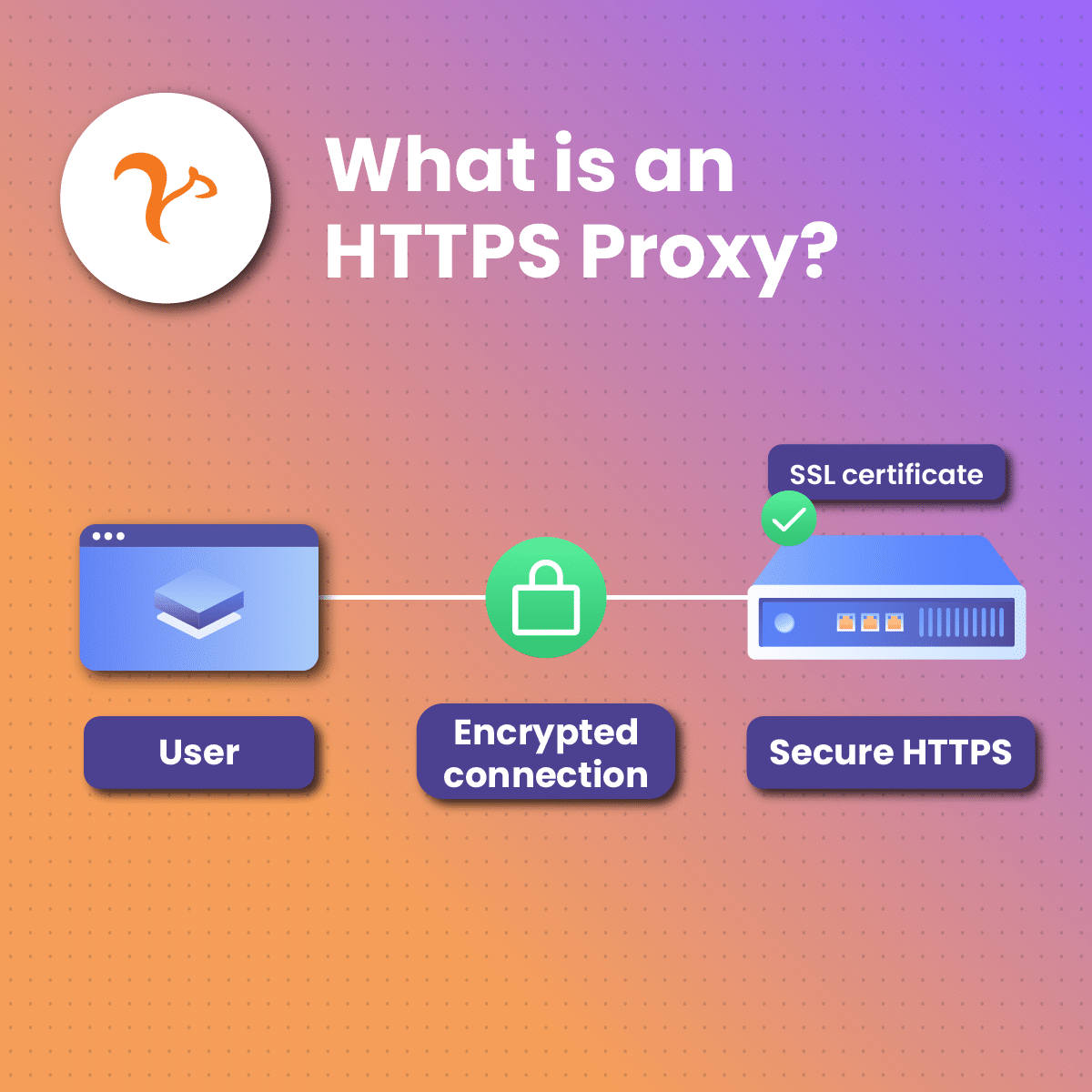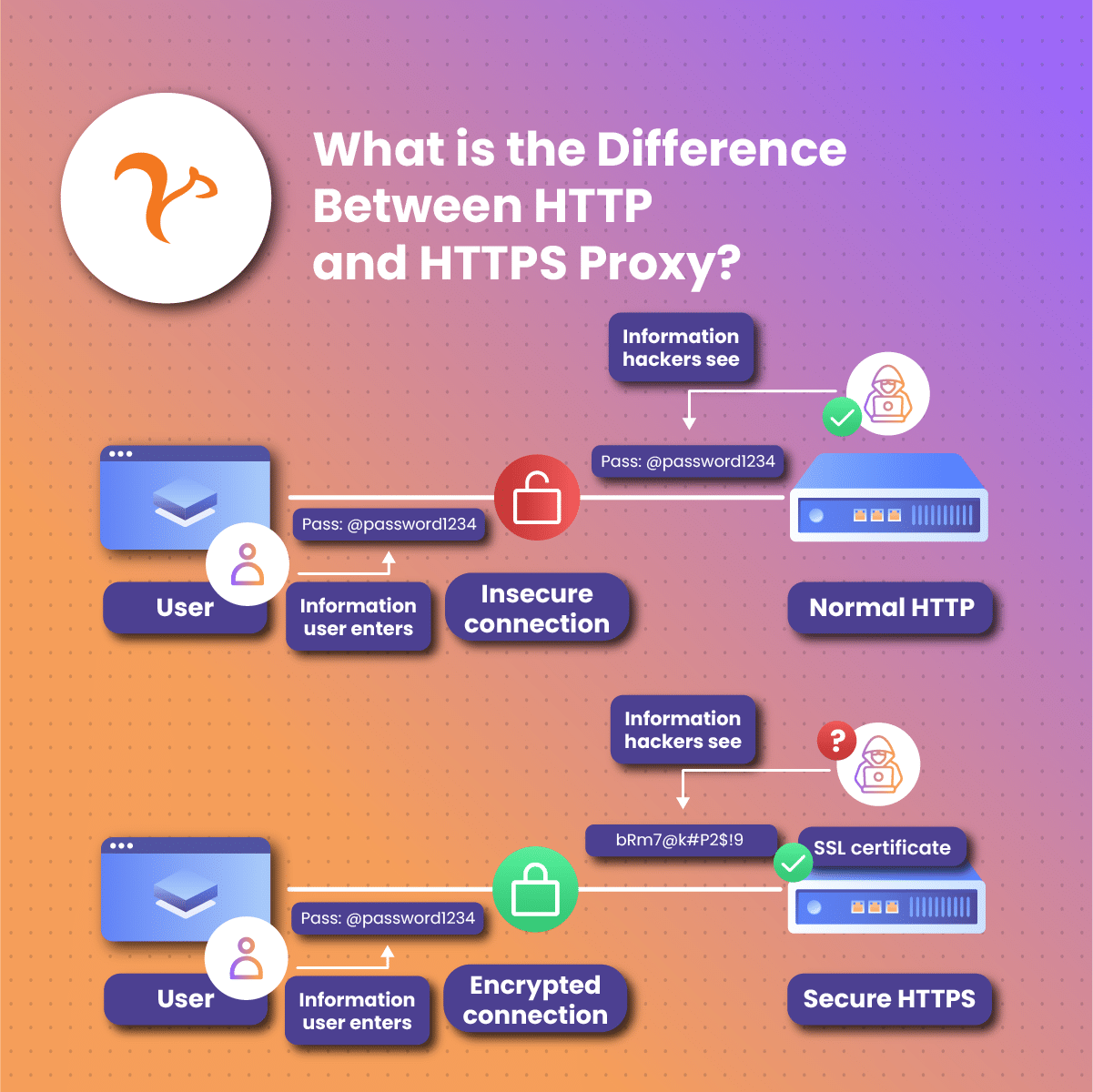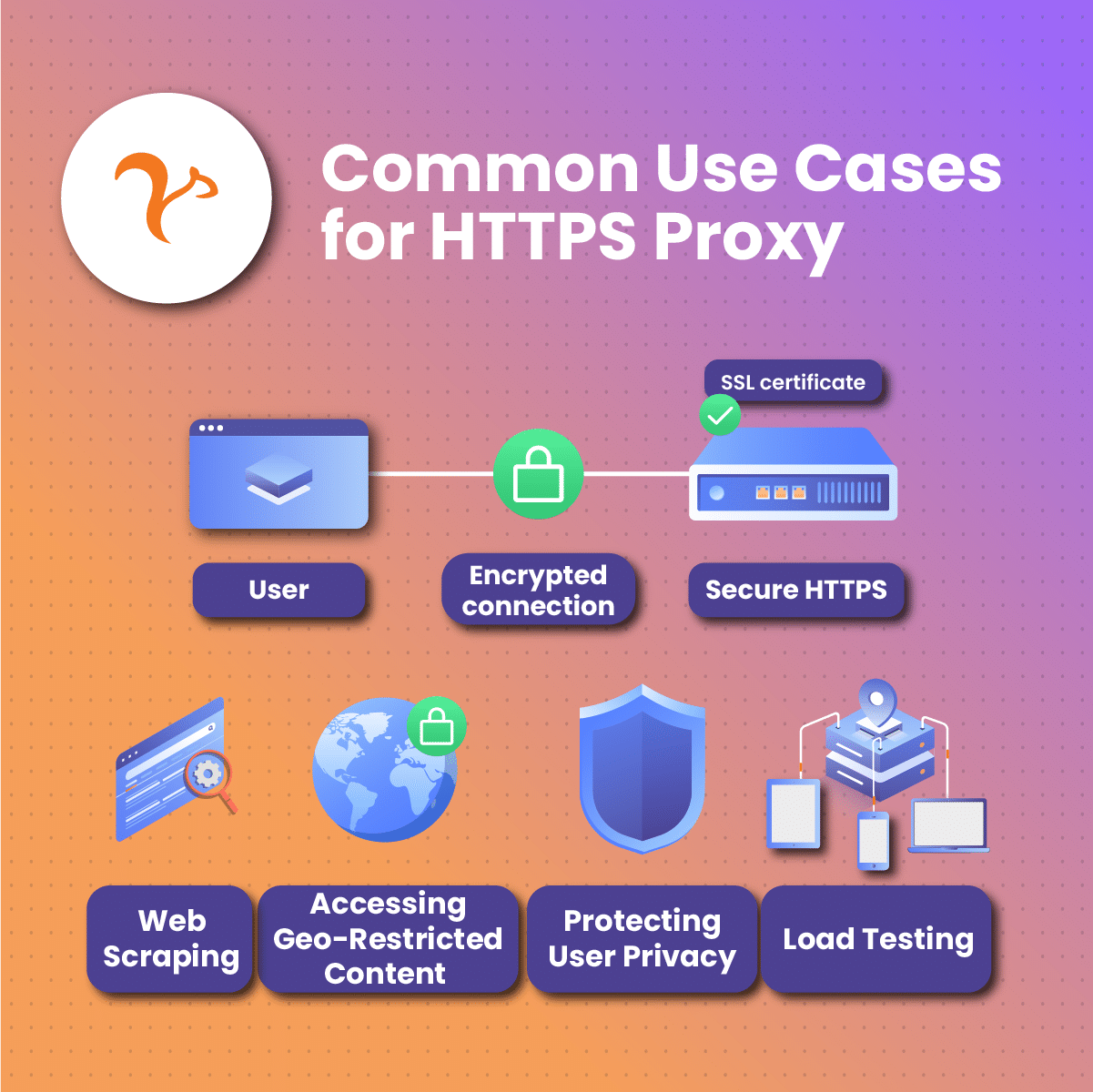Discover how an HTTPS proxy can help secure your online activity. Learn about what an HTTPS proxy is and how it works in this comprehensive guide.
What is an HTTPS Proxy?
An HTTPS Proxy is a type of proxy server that acts as an intermediary between a client and a server for requests made over the HTTPS protocol. This protocol provides secure communication over the internet by encrypting data transmitted between the client and the server. The main purpose of an HTTPS proxy is to maintain privacy and security for its users while they access web content.
Understanding the HTTPS Protocol
The HTTPS (Hypertext Transfer Protocol Secure) protocol combines the HTTP protocol with an additional security layer, usually provided by SSL (Secure Sockets Layer) or TLS (Transport Layer Security). This extra layer encrypts the data transmitted between the client and server, ensuring the integrity and confidentiality of the information exchanged.
How Does an Https Proxy Work?
The HTTPS proxy works by intercepting HTTPS requests from the client and forwarding them to the target server. Upon receiving the response from the server, the proxy decrypts the data, processes it, and re-encrypts it before sending it back to the client. The HTTPS proxy can also be used to cache web content, which can help improve the overall speed and efficiency of web browsing.
The Role of SSL/TLS
When an HTTPS proxy is used, the SSL/TLS handshake occurs between the client and the proxy server instead of the client and the target server. This is known as SSL/TLS termination. The proxy server is responsible for establishing a secure connection with the target server and ensuring that the data transmitted between the client and the proxy remains encrypted.
SSL/TLS Termination
SSL/TLS termination at the HTTPS proxy can offer several benefits, including offloading the computational overhead of encryption and decryption from the target server. This can lead to improved performance and reduced latency for the end user.
Benefits of Using an Https Proxy
There are several advantages to using an HTTPS proxy, including:
Enhanced Privacy and Security
By acting as an intermediary between the client and server, an HTTPS proxy can help maintain the user’s privacy and protect sensitive information from being intercepted or tampered with by malicious third parties.
Improved Performance
An HTTPS proxy can cache web content, which can lead to faster load times and reduced bandwidth usage. Additionally, SSL/TLS termination at the proxy server can offload the computational overhead from the target server, improving overall performance.
Access to Restricted Content
By masking the client’s IP address and location, an HTTPS proxy can help users bypass geographical restrictions and access blocked content on the internet. This can be particularly beneficial for users in countries with strict internet censorship or for those seeking to access region-specific content.
Popular Types of HTTPS Proxies
There are several popular types of HTTPS proxies available for users, each offering unique features and benefits. Some of the most common types include:
Residential HTTPS Proxies
Residential HTTPS proxies use IP addresses assigned to residential internet users. These proxies provide higher levels of anonymity and are less likely to be detected or blocked by websites. They are often used for web scraping, accessing geo-restricted content, and protecting user privacy.
Data Center HTTPS Proxies
Datacenter HTTPS proxies are hosted in data centers and use IP addresses assigned to these facilities. They typically offer faster connection speeds than residential proxies but may be more prone to being detected or blocked by websites. Datacenter proxies are ideal for load testing, web scraping, and other high-bandwidth tasks.
Shared HTTPS Proxies
Shared HTTPS proxies are used by multiple users simultaneously. While these proxies are typically more affordable than dedicated or private proxies, they may suffer from slower speeds and reduced performance due to shared resources.
Dedicated HTTPS Proxies
Dedicated HTTPS proxies, also known as private proxies, are exclusively used by a single user. These proxies offer better performance, speed, and reliability compared to shared proxies but come at a higher cost.
What is the Difference Between HTTP and HTTPS Proxy?
The main difference between an HTTP and an HTTPS proxy lies in the level of security they provide when transmitting data between the client and the server.
HTTP Proxy
An HTTP proxy handles requests made over the HTTP protocol, which does not include any encryption or security layer. This means that the data transmitted between the client and the server is in plain text and can be easily intercepted or read by third parties.
HTTPS Proxy
An HTTPS proxy, on the other hand, handles requests made over the HTTPS protocol, which includes an encryption layer provided by SSL/TLS. This ensures that the data transmitted between the client and the server is encrypted, making it more difficult for third parties to intercept or tamper with the information.
How to Implement an HTTPS Proxy
Implementing an HTTPS proxy can be accomplished in several ways, depending on the specific needs and requirements of the user. Here are some common methods:
Manual Configuration
Many web browsers and applications allow users to manually configure their proxy settings. To set up an HTTPS proxy, users need to enter the proxy server’s address and port number, along with any necessary authentication credentials.
Proxy Auto-Configuration (PAC) File
A PAC file is a JavaScript file that provides a set of rules for determining which proxy server should be used for specific requests. Users can create their own PAC file or use a pre-configured one provided by the proxy service. This file is then loaded into the web browser or application, automating the proxy selection process.
Proxy Software and Tools
There are various software applications and tools available that can help users implement an HTTPS proxy. These tools often provide a user-friendly interface, making it easy to configure and manage proxy settings.
Best Practices for Using an HTTPS Proxy
When using an HTTPS Proxy (1), it is essential to follow best practices to ensure optimal performance, privacy, and security. Some of these best practices include:
Choose a Reputable Proxy Provider
Selecting a reliable and reputable proxy provider is crucial for ensuring the quality, performance, and security of the HTTPS proxy. Look for providers with positive reviews, a proven track record, and a robust infrastructure.
Use Authentication and Encryption
Ensure that your HTTPS proxy supports authentication and encryption to protect your data and maintain privacy. This will help prevent unauthorized access to your proxy and keep your data secure during transmission.
Rotate IP Addresses
Rotating IP addresses when using an HTTPS proxy can help avoid detection and blocking by websites. This is particularly important for web scraping, where maintaining a low profile is essential.
Monitor Bandwidth Usage
Keeping track of your bandwidth usage while using an HTTPS proxy can help you identify and address performance issues. If you notice high bandwidth consumption, consider optimizing your web scraping or data retrieval processes.
Risks and Disadvantages of Using an HTTPS Proxy
While HTTPS proxies offer numerous benefits, there are some risks and disadvantages to be aware of:
Potential for Data Leakage
If the HTTPS proxy is not properly configured or is compromised, sensitive data can be exposed to malicious third parties. It is crucial to choose a trustworthy proxy provider and ensure that your data is encrypted during transmission.
Slower Connection Speeds
Using an HTTPS proxy can sometimes result in slower connection speeds, especially if the proxy server is located far from the target server or has limited bandwidth. Choose a proxy provider with a robust infrastructure and servers located close to your target server to mitigate this issue.
Blocking and Detection
Some websites may block or limit access to users coming from known proxy servers. To avoid this, use reputable HTTPS proxy providers that offer IP rotation and residential IP addresses.
Common Use Cases for HTTPS Proxy
An HTTPS proxy can be used in various situations to improve privacy, security, and access to restricted content. Some common use cases include:
Web Scraping
HTTPS proxies are commonly used for web scraping to gather data from multiple websites while maintaining anonymity and avoiding IP bans or rate limits.
Accessing Geo-Restricted Content
An HTTPS proxy can help users bypass geographical restrictions and access content that is limited to specific regions. This is particularly useful for streaming services, news websites, and other region-specific content.
Protecting User Privacy
By masking the client’s IP address and encrypting data, an HTTPS proxy can help protect user privacy and prevent tracking by websites, advertisers, and other third parties.
Load Testing
HTTPS proxies are useful for load-testing websites and applications, simulating traffic from multiple locations, and identifying potential performance bottlenecks.
Top Advantages of HTTPS Proxy
Enhanced Privacy and Security
Using an HTTPS proxy (1) helps protect user privacy and keep sensitive information secure by encrypting data transmitted between the client and server, making it more difficult for third parties to intercept or tamper with the information.
Improved Performance
An HTTPS proxy can cache web content, leading to faster load times and reduced bandwidth usage. Additionally, SSL/TLS termination at the proxy server can offload the computational overhead from the target server, resulting in improved overall performance.
Access to Restricted Content
By masking the client’s IP address and location, an HTTPS proxy can help users bypass geographical restrictions and access blocked content on the internet. This is particularly beneficial for users in countries with strict internet censorship or those seeking to access region-specific content.
Top Disadvantages of HTTPS Proxy
Potential for Data Leakage
If the HTTPS proxy is not properly configured or is compromised, sensitive data can be exposed to malicious third parties. It is crucial to choose a trustworthy proxy provider and ensure that your data is encrypted during transmission.
Slower Connection Speeds
Using an HTTPS proxy can sometimes result in slower connection speeds, especially if the proxy server is located far from the target server or has limited bandwidth. Choose a proxy provider with a robust infrastructure and servers located close to your target server to mitigate this issue.
Blocking and Detection
Some websites may block or limit access to users coming from known proxy servers. To avoid this, use reputable HTTPS proxy providers that offer IP rotation and residential IP addresses.
Comparison Table: Advantages and Disadvantages of HTTPS Proxy
| Advantages | Disadvantages |
| Enhanced Privacy and Security | Potential for Data Leakage |
| Improved Performance | Slower Connection Speeds |
| Access to Restricted Content | Blocking and Detection |
Resources
- NetNut – NetNut is a residential proxy provider that offers a secure and reliable way to surf the web anonymously. It provides a fast and reliable connection with unlimited bandwidth.
- Watchguard: This resource provides information and guidance on HTTPS proxies within the context of WatchGuard’s network security products.
- Greenprophet: This article explores the benefits and applications of using an HTTPS proxy for digital nomads, emphasizing how it can enhance security and privacy while working remotely.
- Proxy Server – This Wikipedia page provides a detailed explanation of what a proxy server is and how it works.
- Ostec – The post explains the concept of an HTTPS proxy, which is a type of proxy server that intercepts and filters HTTPS traffic between a client and a web server.








